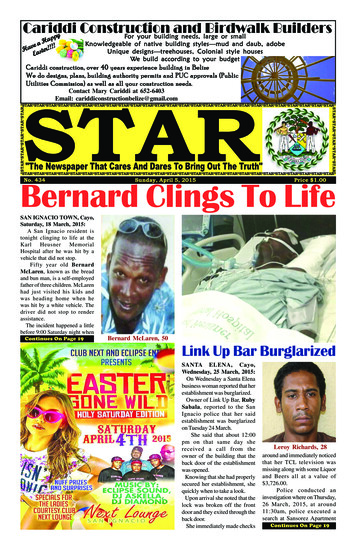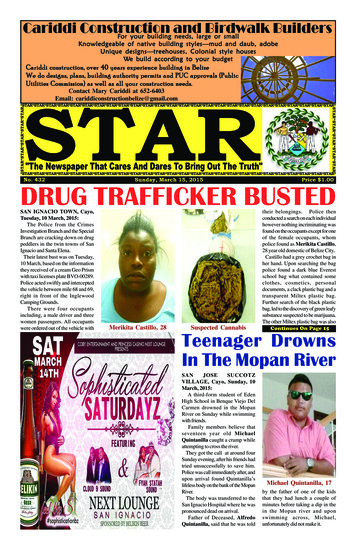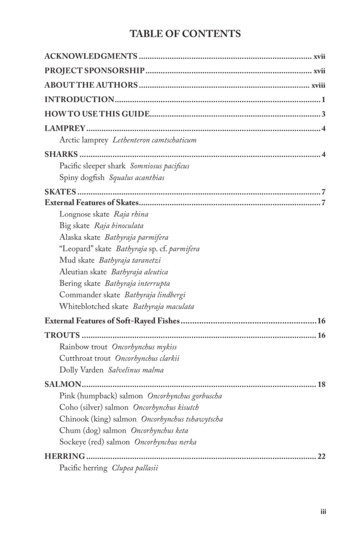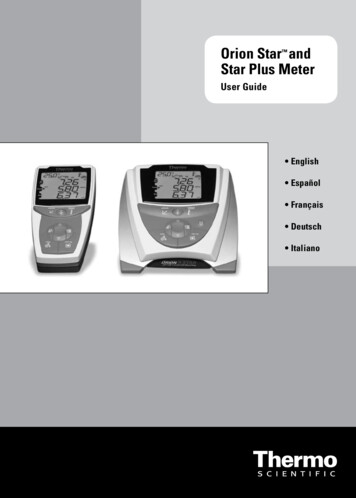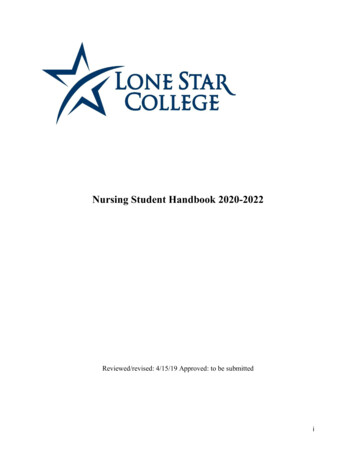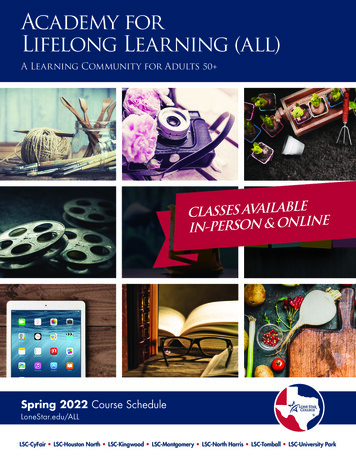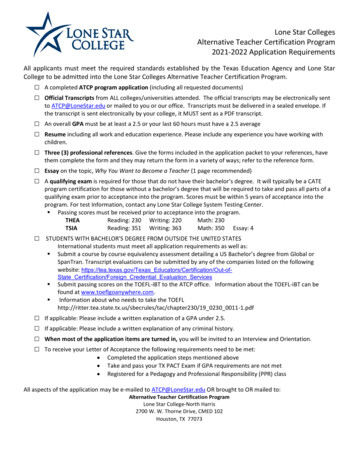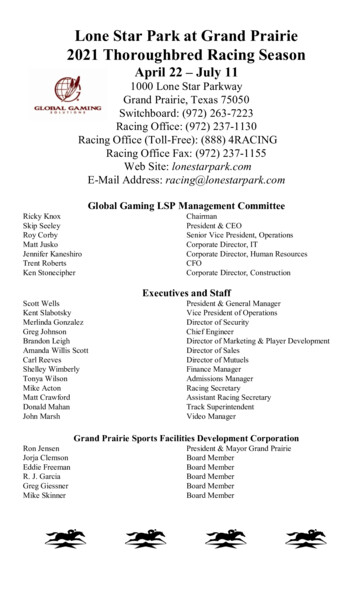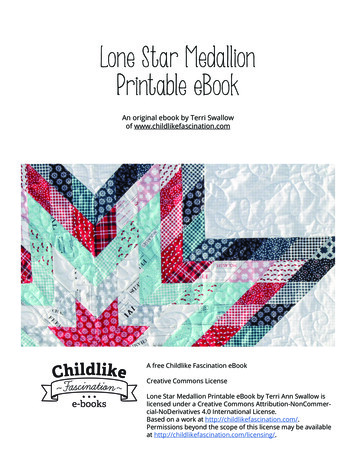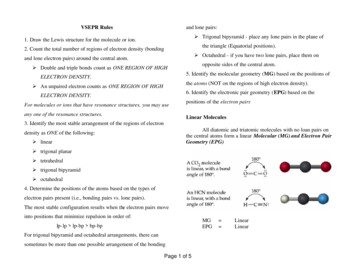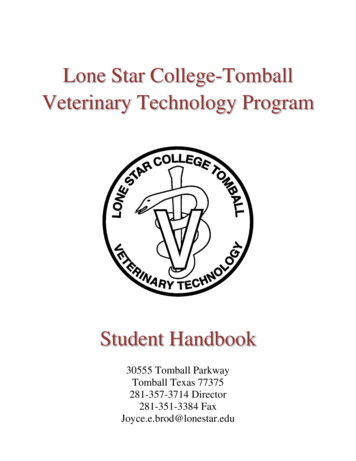
Transcription
Lone Star College-TomballVeterinary Technology ProgramStudent Handbook30555 Tomball ParkwayTomball Texas 77375281-357-3714 Director281-351-3384 FaxJoyce.e.brod@lonestar.edu
2017-2018VETERINARY TECHNICIANCODE OF ETHICSVeterinary Technology Student HandbookPage 2
2017-2018Veterinary Technician Code of Ethics1. Veterinary technicians shall aid society and animals through providingexcellent care and services for animals.2. Veterinary technicians shall prevent and relieve suffering of animals.3. Veterinary technicians shall promote public health by assisting with thecontrol of zoonotic disease and informing the public about these diseases.4. Veterinary technicians shall assume accountability for individual professionalactions and judgment.5. Veterinary technicians shall protect confidential information provided by theclients.6. Veterinary technicians shall safeguard the public and the profession againstindividuals deficient in professional competence or ethics.7. Veterinary technicians shall assist with efforts to ensure conditions ofemployment consistent with excellent care of animals.8. Veterinary technicians shall remain competent in veterinary technologythrough a commitment to lifelong learning.9. Veterinary technicians shall collaborate with members of the veterinarymedical profession in efforts to ensure quality health care service for allanimals.Veterinary Technology Student HandbookPage 3
2017-2018Veterinary Technician OathVeterinary Technology Student HandbookPage 4
2017-2018Veterinary Technician OathI solemnly dedicate myself to aiding animals and societyby providing excellent care and services to animals byalleviating animal suffering, and promoting public health.I accept my obligations to practice my professionconscientiously and with sensitivity, adhering to theprofessions’ Code of Ethics and furthering my knowledgeand competence through a commitment to lifelonglearning.Veterinary Technology Student HandbookPage 5
2017-2018General InformationVeterinary Technology Student HandbookPage 6
2017-2018The two-year veterinary technology associate of applied science degree provides the graduate withinformation, skills and experience they will need to follow a fulfilling career in a veterinary hospital, azoological garden, industry, a medical research laboratory, a governmental regulatory program or theVeterinary Medical Corp.Gaining its accredited status in 1990, today the Veterinary Technology program boasts a 99.9% passagerate on the State and National Board Examination. This success rate is unparalleled in the State of Texasand is rated as one of the highest passage percentage of the 200 plus programs accredited by the AmericanVeterinary Medical Association.Because the veterinary technology program is fully accredited by the American Veterinary MedicalAssociation, students are eligible to take all State and National Board examinations as well as work in allareas of animal health care. An individual spends time in laboratories working with cows, dogs, cats, horses,pigs, sheep, goats, exotics and even the more traditional laboratory animals like mice and rabbits. Upongraduation the student is free to pursue any type of animal care situation they so desire.Job opportunities for Licensed Veterinary Technician graduates have never been better. Today there arefulfilling and exciting jobs available to graduates just in the immediate Harris – Montgomery County. Aswell as the impressive job market, it should be mentioned that scholarships are also available while thestudent is enrolled.The general education core will transfer to a variety of colleges and universities. The entire 60 hours ofcredit in the veterinary technology program will transfer to some traditional four year colleges so studentsmay pursue a four year baccalaureate degree in either animal science or agricultural business. Contact anadviser, or faculty member at any of the colleges for specific information and to obtain the recommendedsequencing of courses. The sequence of courses can also be found at www.lonestar.eduGeneral GuidelinesAny student anticipating entrance into the veterinary technology program should ensure that remediation isnot required after admission examinations are completed and have been reviewed. If admissionexaminations indicate the student is in need of remediation in math, English or reading, the student mustsuccessfully complete those requirements before applying for entry into the Veterinary Technologyprogram.Admission ProcedureIn addition to the admission requirements of the Lone Star College district, the following are requirementsfor admission into the veterinary technology associate of applied science degree veterinary technologyprogram:ACT scores of:Math 24 Writing 19 Reading 19 College Math TSI met (if within 5 yrs)SAT scores of:Writing 500 Reading 500Math 520 THEA Scores of:Math 270 Veterinary Technology Student HandbookPage 7
2017-2018Writing 220 Reading 230 ASSET scores of:Math IA 45 or CA 23 Writing 45 and6 essay or 7 essayReading 41 COMPASS scores of:Math Alg 60 or ColALg 0-40Writing 85 and 6 essay or 7 essayReading 81 ACCUPLACER scores of:Math 86 Writing 80 Reading 78 Students should submit a LSC-Tomball application along with current (official) college transcripts to theadmissions department at LSC-Tomball. After visiting with an adviser, the student should submit a separateapplication to the Veterinary Technology program with a duplicate college transcript. Note: the applicationto the Veterinary Technology program must be co-signed by LSC-Tomball advisor during the student’svisit in the admissions department. The veterinary technology admissions application form is also availableon the college website at www.lonestar.eduBiol 1406 and Math 1314 if transferring or completed at LSCS, must have been completed with at least agrade of C within the last five years.Program applications are reviewed and evaluated for fall admission on June 1st of each year. All applicantswill be notified following the applicant review date of their status. Students may be notified by letter orphone or both. It is the responsibility of the applicant to insure all personal information on the applicationis current.1. When admitted to the Veterinary Technology program, the student should insure that nonveterinary technology courses (math, English, etc.) are never scheduled between 7:30 AM and9:00 AM Monday through Friday and 8:00 -9:00 am on Saturday and Sunday. This time isreserved for all clinical rotations at LSC-Tomball.2. The Veterinary Technology program will have an information session at the end of June each year.Students that have received admission notifications are encouraged to attend as importantinformation on rules and program requirements will be covered in detail by the program faculty andstaff. Questions will be welcomed.3. Students receiving admission to the program should be aware that class notes, books, DVDs, andother supplies are required for every class along with special clothing for all clinical laboratories.Students should expect to purchase all clothing supplies at the beginning of their first fallsemester and all classroom supplies should be purchased during the first week of each VTHTclass.Veterinary Technology Student HandbookPage 8
2017-2018Progression RequirementsThere are no specific progression requirements for the veterinary technology program. However, eachstudent should take VTHT 1245, VTHT 2223, VTHT 2331, VTHT 1441, and VTHT 1140 within onecalendar year of registration for the Veterinary Technology Clinical VTHT 2360. VTHT 1413 must besuccessfully completed before progression into any other VTHT courses except for VTHT 1125Pharmaceutical Calculations. VTHT 2360 is the only course offered multiple semesters. All other coursesare only offered in the semester listed in the catalog. Failure to complete this requirement will necessitatedelay of the clinical until requirements can be met.Registration ExaminationStudents in veterinary technology at Lone Star College System are considered eligible to sit for the State(LVTE) and National Veterinary Technology Board (VTNE) Examinations when they have completed allrequired course work.Hierarchy of Veterinary PracticeThe veterinary hospital is staffed by persons with varying degrees of educationalexperience. Tasks performed in the hospital, to provide animal care, should be assigned to personsin the level where education/training exists to ensure a positive outcome for the patient. Theremay be times when an employee may be asked to work at a level below their expertise, but inkeeping with the philosophy of quality animal care, the opposite should not take place.Veterinarian – solely responsible for diagnosing, prescribing medication & surgery. Ultimatelyresponsible for all patient care and outcomes.Licensed Veterinary Technician – veterinary technicians who have an Associate of AppliedScience degree in veterinary technology and have graduated from a school accredited by theAmerican Veterinary Medical Association. This person has training and experience and thus isin a supervisory role.Graduate Veterinary Technicians – persons who have successfully completed and earned adegree from an AVMA – accredited veterinary technology program but are not licensed with theState of Texas.Certified Veterinary Assistants – may have training through high school or college certificateprograms, but most are likely trained on the job by the veterinarian or the veterinary technicianand certified by the State of Texas.Veterinary Assistant - is hired with no previous medical training and trained by the veterinarystaff at the animal hospital.Kennel help, receptionist – persons trained on the job to provide a service in a specific area asin cleaning or receptionist duties.Veterinary Technology Student HandbookPage 9
2017-2018Lone Star College-TomballVeterinary Technology Associate DegreeStatement of Mission/PurposeLone Star College System as a publicly supported, two year, comprehensive communitycollege system involves diverse individuals, businesses, and the community in quality educationopportunities for the successful development of knowledge, skills, and attitudes for a rapidlychanging world.Veterinary TechnologyThe Veterinary Technology Program recognizes the importance of the LicensedVeterinary Technician as a partner in the health of various animal species involved in veterinarymedicine, research and government service. Integrating the essential academics with practical,hands-on participation, the Veterinary Technology Program provides opportunities for studentsto become proficient in the varied techniques and procedures utilized daily by LicensedVeterinary Technicians. This program is a veterinary nursing program and does notsubstitute for a pre-veterinary or veterinary degree.IntroductionThe Veterinary Technology Program at LSC-Tomball is structured to allow one classadmission per year. The curriculum provides combined studies of college level generaleducation courses and rigorous course work in science, animal health care, management andveterinary medical concepts. The College seeks highly motivated students interested inbecoming Licensed Veterinary Technicians.After successful completion of the Veterinary Technology program courses, an Associateof Applied Science Degree in Veterinary Technology is awarded. Graduates of an AVMAaccredited program are then eligible to sit for state and national certification exams. Successfulcompletion of the examinations leads to licensing in the state of Texas. The LSC-TomballVeterinary Technology Program is accredited by the American Veterinary Medical Association.The demands for a Licensed Veterinary Technician in private practice, industry,government, and institutions of higher education remain high. The income potential for the LVTvaries greatly depending upon the type of employment.Veterinary Technology Student HandbookPage 10
2017-2018Advisory BoardThe veterinary technology program at Lone Star College-Tomball has an advisory board, whichconsists of professionals from the program field. The board meets annually or as often as neededto discuss issues of curriculum, community involvement and to provide feedback to LSCTomball regarding current needs and exceptions within their professional communities.Advisory Board MembersClinicalAnimal Emergency Clinic of ConroeGulf Coast Veterinary Surgery, P.C.HCPHES – Veterinary Public HealthNorth Houston Veterinary SpecialistsUT MD Anderson Cancer CenterUT Health Science Center-HoustonAnimal Clinics of the WoodlandsWaller Equine HospitalPracticum1488 Animal Medical Center*All Pets Animal Hospital Katy*Angel’s Pet HospitalAnimal Hospital of Conroe, Inc.Animal Hospital Champions NWAnimal Hospital Jones RoadAnimal Hospital of the Woodlands*Best Friends Veterinary HospitalBrittmore Animal Hospital*Deer Park Animal Hospital*Four Seasons Veterinary HospitalHempstead Veterinary ClinicJust Cats Veterinary Services*Lone Star Veterinary HospitalMayde Creek Health CenterMemorial-610 Hospital for AnimalsPaws to ClawsPrestonwood Animal Clinic*Shady Brook Animal Hospital*Stuebner Airline Veterinary HospitalThe Village VetVCA Tomball Animal HospitalWaller Animal HospitalWest Davis Veterinary Clinic* Hospital also serves as a Clinical siteVeterinary Technology Student HandbookPage 11
2017-2018ACADEMIC STANDARDS &POLICIESVeterinary Technology Student HandbookPage 12
2017-2018Professional ConductVeterinary Technology is a licensed profession requiring a high standard of personalbehavior. We are bound by legal, ethical, and moral obligations in addition to those that arecommon to every member of society. Veterinary Technicians represent their employer to theirclients who entrust them with the care of their pets. The Program requires that all studentsbehave professionally at all times. Knowledge of and adherence to a professional standard ofbehavior is an integral part of the Veterinary Technology curriculum. Violations of professionalstandards may result in penalties ranging from a failing grade to expulsion from the Program.Scholastic DishonestyIt is in the best interest of our students that scholastic dishonesty not be tolerated and that collegepolicies and procedures be followed so as to provide consistent college-wide enforcement.Scholastic dishonesty includes, but is not limited to; cheating on a test, plagiarism and collusion.For further information on this subject, see Lone Star College Student Handbook online.Any student accused violating the Student Handbook has the right to file an appeal as set forth inLone Star College Policy.Excessive Absence PolicyEach instructor reserves the right to drop any student who has excessive absences. Studentabsences are recorded from the official date of enrollment. Both tardiness and earlydepartures from class are forms of absenteeism. The instructor establishes the policy withregard to each. Absences of each student are recorded without exception. Instructors areencouraged to drop students who are excessively absent, and/or experience academic problems.Absences do not have to be consecutive. A student dropped from a class for excessive absencesmay be given a grade of “W”. For further information on this subject, see Lone Star CollegeStudent Handbook.Disability ActThe Lone Star College System strives to follow the Americans with Disabilities Act asAmended. For any special accommodations issues or alternate format, contact the Lone StarCollege Student Success Center at 281-357-3703. Students are required to lift a minimum of 50pounds and meet any and all physical requirements outlined below. Once documented withStudent Success, it is the student’s responsibility to notify Lone Star College-Tomball VeterinaryTechnology Program of their disability so that the appropriate accommodations can be made.Documentation must be on file with Lone Star College-Tomball Veterinary Technology Programbefore any accommodations can be made.Veterinary Technology Student HandbookPage 13
2017-2018Some Examples of Skills and Aptitude Needed for Success in a Veterinary TechnologyCareer:Critical Thinking-Critical thinking sufficient for clinical judgment. Identify cause-effectrelationships in clinical situations. Develop nursing care plans. Demonstrate problem solvingskills. Adapt to stressful situations.Interpersonal-Interpersonal abilities sufficient to interact with patients, clients, families &groups from a variety of social, emotional, cultural & intellectual backgrounds. Establish rapportwith patients/clients & colleagues. Recognize appropriate boundaries in relationships withpatients/clients & colleagues.Communication-Communication abilities for interaction with others orally & in writing.Explain treatment procedures, initiate health teaching, document & interpret nursing actions andpatient/client responses.Mobility-Physical abilities sufficient to move from room to room, maneuver in small spaces &provide assistance to patients. Safely move around in patient & treatment areas. Administer CPR.Provide physical assistance to clients & colleagues to ensure safety within the environment.Ability to prevent or escape injury caused by animals. (i.e. biting, kicking, stampede)Motor Skills-Gross & fine motor abilities sufficient to provide safe, effective nursing care in atimely manner. Use of instruments, supplies, safety devices and communication equipment in thecare of patients. Performance of nursing care, surgical assistance, & laboratory techniques.Hearing-Auditory ability sufficient to monitor and assess health needs. Hear auscultory sounds,monitor alarms, emergency signals, and cries for help. Hear warning sounds from animals andhumans of impending danger/injury.Visual-Visual ability sufficient for observation and assessment necessary in nursing care.Observe patients for expected and unexpected physical and emotional responses to nursing andmedical treatment regimens. Use of diagnostic equipment such as a microscope, thermometer,refractometer, etc.Tactile-Tactile ability sufficient for physical assessment and to perform nursing duties in atimely manner. Perform palpation functions of physical exam. Administer oral, intramuscular,subcutaneous, & intravenous medications. Insert and remove tubes and perform wound caremanagement. Surgical assistance.Physical Condition-Physical ability and stamina sufficient to restrain, lift, & assist in the care ofa variety of species of animals. Ability to stand for extended periods of time. Ability to withstandextreme weather conditions. Immune system competence. Safely lift, position and restrainanimals such as; dogs, cats, cattle and horses, and supplies for treatment. Surgical assistance.Daily clinical routine, cleaning cages and feeding animals. Year round treatment and care ofoutdoor animals. Exposure to a wide range of chemical and biological agents.Missed Instruction/Exams and TutoringStudents are responsible for missed instruction and are expected to contact their instructors whenabsent in order to obtain missed material. If a student is absent on an examination day, themissed lecture exam or lab exam will be given at the discretion of the instructor.Veterinary Technology Student HandbookPage 14
2017-2018Graduation RequirementsThe general requirements for an Associate of Applied Science Degree in VeterinaryTechnology from Lone Star College-Tomball are:Completion of minimum requirements specified for the degree.Completion of all 60 hours of program requirements.Eligibility for LVT State and National Exam1.Completion of all 60 hours of program requirements.2. A cumulative grade point average of 2.0 or betterDISCIPLINARY POLICYThe Veterinary Technology Program adheres to the policies stated in the LSC-Tomballcatalog and the LSCS Board Policy. This catalog is available on all campuses and the Policy maybe located at www.lonestar.edu.We encourage all students to conduct themselves in a professional manner. All instructorsand staff will treat you with respect, and we expect the same courtesy. Our goal is to assist you inaccomplishing your educational goals. We will help you to work through any educational orpersonal difficulties that hinder your education. However, we will not allow disruption of theeducational process or interference with another student’s opportunity to receive an education.If difficult situations occur, it is the responsibility of all parties involved – staff, instructorsand students to resolve it in a mature manner. If you cannot resolve a situation through one-onone discussion, then the Program Director may assist where necessary.DISCIPLINARY OFFENSES INCLUDE, BUT ARE NOT LIMITED TO THEFOLLOWING:1. Inadequate attendance in class and/or laboratory.2. Disruption of classroom and/or laboratory sessions.3. Insolent or disrespectful behavior toward instructors, staff or students.4. Unprofessional behavior or dress.5. Failure to perform or poor performance in clinical rotation labs.** Includes any VTSO (student organization) function or meeting.Veterinary Technology Student HandbookPage 15
2017-2018IMMEDIATE DISMISSAL INCLUDES:1. Dangerous and/or unsafe practices during class or laboratory.2. Theft.3. Cruelty, neglect, or unprofessional treatment of any animal.4. Cheating or dishonesty.5. Serious violations of the LSCS Student Code.** Includes any VTSO (student organization) function or meeting.Veterinary Technology Student HandbookPage 16
2017-2018STUDENT RIGHTS ANDRESPONSIBILITIESVeterinary Technology Student HandbookPage 17
2017-2018VisitorsDue to liability issues, only students are allowed in kennel and laboratory areas during or afterclass time—especially when CLINCAL ROTATIONS are occurring.Adults may visit classrooms at the discretion of the instructor. Please contact the office so thatan appointment can be scheduled and a representative made available to facilitate a tour.Campus, Veterinary Technology Building and Uniform RequirementsCLOTHING FOR LECTURE/LABORATORIES:1. Lecture: Landau Wine scrubs are required with appropriate patch andnametag/monogram.http://www.landau.com/ http://www.allheart.com/landau/c/539/view/all/2. Laboratories: Landau Wine scrubs must be worn. Your name should be monogrammedand nametag placed over the left-hand pocket of the scrub top. On the left sleeve of thescrub top, the LSC-Tomball Vet Tech patch must be sewn on. Medium to Dark Graytennis shoes are required, with minimal other colors, laces should be white or gray.Required laboratory jacket, it must be a Landau Wine ½ to ¾ length laboratory jacket.The lab jacket is required in all laboratories when working with blood or feces. The VetTech patch has to be on the upper left sleeve and your name on the upper left front of thecoat. An undershirt may be worn only if it is a white T-shirt that has no collar andsleeves must not hang below your scrub top sleeves. The undershirt must be tucked in atall times. In your laboratory classes you are required to wear a watch with a second handor a digital watch with seconds reading. No Smartwatches.Large Animal Uniform - Navy Blue Dickies Short Sleeve Jumpsuit, Black rubber rt-sleeve-coverall/33999.html?dwvar 33999 color DN#start 13. It is recommended that the above dress code be followed at all times whether on or offthe campus. Students failing to follow the dress code will be considered absent for theday and will not be allowed to take examinations (scheduled or unscheduled) on that day.4. Students should carry a writing instrument and note pad at all times.5. If students elect, at any time, to wear scrubs or large animal uniform anywhere at LSCTomball, they should be worn in their completeness or not at all. (e.g. do not wear scrubtop with a pair of blue jeans)Veterinary Technology Student HandbookPage 18
2017-20186. LSC-Tomball is a smoke free building. The veterinary technology classes are tobaccofree.7. Alcohol/Substance Abuse – Is prohibited in accordance with the LSCS Student Code ofConduct.8. Campus Carry - The Texas Legislature enacted campus carry by passing Senate Bill 11,effective at LSC on August 1, 2017. Senate Bill 11, known as the “Campus Carry” law,amends Texas law to allow license holders to carry concealed handguns on collegecampuses. To carry a concealed handgun on LSC campuses, an individual must have avalid License to Carry issued by the Texas Department of Public Safety.LSC has established rules and regulations regarding enforcement of Campus Carry. LoneStar College prohibits concealed carry in some areas of LSC campuses. For moreinformation about Campus Carry, visit the LSC Campus Carry website athttp://www.lonestar.edu/campuscarry.Personal Grooming1. Professional appearance when in clinical settings.2. Good personal hygiene is required.3. All clothing should be clean and free from wrinkles, stains, ragged hems and pants shouldbe at least ½” from the floor.4. Hair should be well groomed and pulled out of face and off shoulders in the laboratorysessions.5. Male students should be freshly shaven or have well groomed beards, mustaches, andsideburns.6. Fingernails are to be kept at a length and shape consistent with patient and personalsafety.7. The use of safety goggles or other eye protection is required in the laboratory.8. No jewelry is permitted when wearing the small or large animal uniform. This includespiercing and ear gauges.9. No tattoos are allowed to be visible while in small or large animal uniforms. Tattoosshould be covered with clothing or bandage according to the program director.Veterinary Technology Student HandbookPage 19
2017-2018Pregnancy and Special NeedsBecause of the nature of this profession, there are certain limitations that will occur withpregnancy. The hazards that accompany many of our courses include radiation, anesthetic gases,formalin, as well as other chemicals can be highly detrimental to an unborn fetus. Any studentwho believes she may be pregnant should report to the program director for further instructions.The student will undergo counseling on potential hazards and be requested to sign a statementfrom a physician defining physical limitations during pregnancy. For any reasonableaccommodation issues or alternate format, contact the LSC- Tomball Student Success Center at281-357-3703. All documentation will have to be on file before any reasonable accommodationswill be provided by the veterinary technology program.TransportationIt is the student’s responsibility to have adequate and reliable transportation throughout the twoyears of this program.PunctualityStudents are expected to come to class, be on time and use class time wisely. Students should bein class before the start of lecture. The doors will be closed at the start of each class and studentswill not be allowed to enter, resulting in an absence and missed instruction for that day.Remember a tardy is the same as an absence. Three absences equal dismissal from the course.Commitment and RespectWe recognize you have made a significant commitment to our program. We hope that youaccomplish all of your goals while you are in the LSC-Tomball Veterinary Technology Program.The faculty and staff of the Veterinary Technology Program are dedicated to helping yousucceed.This procedure manual outlines the rules and standards of the LSC-Tomball VeterinaryTechnology Program. You are expected to follow all rules and procedures. You are expected totreat all faculty and staff with appropriate professional respect.If you have questions or concerns please go to your individual course instructor first and try tofind a solution. If things are not solved, then bring your concerns to the program director’sattention at that time. Academic and Non-Academic grievance procedures can be found in theLSC Student Handbook.Veterinary Technology Student HandbookPage 20
2017-2018SmokingThe smoking policy of LSCS prohibits smoking in all classrooms, hallways and buildings.Smoking is only permitted in the parking areas of the campus.Cell Phones/Pagers/Visual Recording DevicesCell phones and pagers are required to be placed within student lockers before entrance into anyLSC-Tomball Veterinary Technology Program classroom. Failure to follow this requirementmay result in the instructor counting you absent for that day, taking points off an exam and/orconfiscating them up for the remainder of the class. Cell phones and pagers are prohibited in alllaboratory areas.Student Animal PolicyStudent owned animals cannot be brought onto campus as we have limited cage space foradditional animals.Veterinary Technology Student HandbookPage 21
2017-2018Estimated Program CostThe following is an itemized estimate for the cost of the 6 semester Associate in Applied ScienceDegree Program. TUITION AND FEES ARE SUBJECT TO CHANGE.Tuition & Student Fees:In District @ 94.00/ hr X 60 hrs. 5640.00Out of District – (Texas Resident)@ 164.00/ hr X 60 hrs. 9840.00International – Out of State@ 230.00/ hr X 60 hrs. 13800.00Scrubs: Top and BottomsVeterinary Technology Patch 39.95 4.95 – eachWine Lab Coat * 20.00Name tag or monogramming 8.00 – 15.00Large Animal 35-45.00†Black Rubber Boots for Large Animal Uniform 15.00Gray Tennis Shoes 10.00 – upVeterinary Technology Student HandbookPage 22
2017-2018Veterinary Technology Student HandbookPage 23
2017-2018Veterinary Assistant Certificate ProgramCourse SequenceCourse#TitleCredit1st Fall*VTHT****VTHT* VTHTBIOLENGLMATH****VTHT1**VTHT** 3141413110922091321112511662321Introduction to Veterinary TechnologyVeterinary Medical TerminologyExotic Animal Clinical MgmtBiology IComposition and Rhetoric ICollege Algebra312433SEMESTER TOTAL161st SpringVeterinary Anatomy and PhysiologyVeterinary NutritionFood Animal Clinical MgmtBusiness and Professional Communication4123SEMESTER TOTAL101st SummerPharmacological Calculations (6 Weeks)Pract
Veterinary Technology Program . Student Handbook . 30555 Tomball Parkway . Tomball Texas 77375 . 281-357-3714 Director . 281-351-3384 Fax . Joyce.e.brod@lonestar.edu . 2017-2018 . Veterinary Technology Student Handbook Page 2 . VETERINARY TECHNICIAN CODE OF ETHICS . 2017-2018 .
